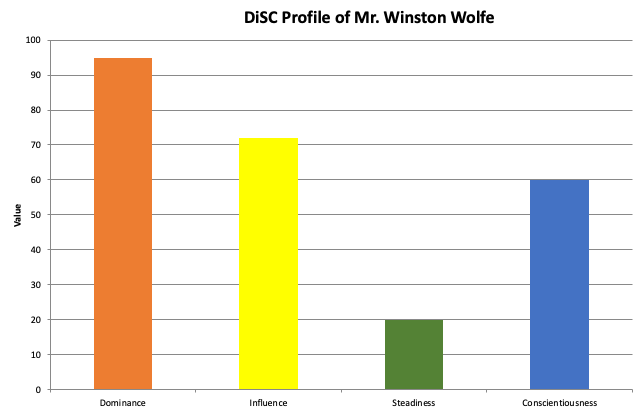As a certified DiSC and 12 Driving Forces practitioner, I've always been fascinated by the complex interplay of personality traits and motivations that define a character. And when it comes to unforgettable characters, one of my all-time favorites is Winston Wolfe, or as he's more commonly known, "The Wolf," from Quentin Tarantino's iconic film, "Pulp Fiction." The Wolf, with his sharp suits, razor-sharp wit, and unflappable demeanor, is a master class in crisis management.
But what makes him tick? What are the underlying traits and motivations that drive his actions? To answer these questions, I decided to apply my knowledge of DiSC and 12 Driving Forces to break down the enigma that is Winston Wolfe.
Let's start with DiSC.
DiSC

Dominance (D:90):
"If I'm curt with you, it's because time is a factor here. I think fast, I talk fast, and I need you guys to act fast if you want to get out of this. So, pretty please, with sugar on top, clean the f***ing car."
The Wolf is a clear example of a high-D personality. He is direct, decisive, driven, and demanding. He is comfortable taking risks and focuses on the big picture rather than the details. His high confidence and self-motivation are evident in his ability to take control of chaotic situations and quickly devise effective solutions. However, his dominant trait can also lead to impatience and insensitivity, as he may force decisions or take actions without forming a consensus.
Influence (i:70):
"Just because you are a character doesn't mean that you have character."
The Wolf also exhibits some traits of the high-I personality. He is extroverted and outgoing, and he uses his charm and social skills to influence others. However, he does not seem to fear social rejection or overlook details and tasks, which are typical shadow sides of a high-I personality.
Steadiness (S:20):
The Wolf does not prominently display characteristics of a high-S personality. He does not avoid conflict to preserve relationships, nor does he fear change or loss of stability. He is not indecisive or overly accommodating, which are typical traits of a high-S personality.
Conscientiousness (C:60):
The Wolf shows some traits of a high-C personality. He is cautious, competent, and detail-oriented. He values precision and has an inquisitive nature. However, he does not avoid conflict by changing the subject, nor does he fear criticism, which are typical shadow sides of a high-C personality.
Overall, he primarily exhibits traits of a high-D personality, with some traits of a high-I and high-C personality. He is a decisive, driven, and competent problem-solver who uses his charm and social skills to influence others.
12 Driving Forces
Ok, next up are the 12 Driving Forces, or what motivates Mr. Winston Wolfe.
Knowledge
This category measures how individuals gather and utilize information. Those with an Instinctive drive use past experiences, intuition, and real-time research to solve immediate needs. On the other hand, individuals with an Intellectual drive continuously seek to acquire knowledge, discover, and find opportunities to learn.
For Winston, I'd break it down this way:
- Instinctive: 40/100 - The Wolf uses past experience, intuition, and real-time research to solve immediate needs.
- Intellectual: 20/100 - He acquires knowledge and finds opportunities to learn, although this is not his primary driver.
Utility
This category assesses how individuals use resources. Those with a Selfless drive invest all their resources and time into completing tasks, regardless of constraints. Conversely, individuals with a Resourceful drive find ways to maximize productivity and focus on getting a return for their time, talent, or resources invested.
- Selfless: -30/100 - The Wolf does not invest all of his resources and time into completing tasks, regardless of constrictions.
- Resourceful: 60/100 - He finds ways to maximize productivity and focuses on getting a return for his time, talent, or resources invested. Evidenced here, "That gives us exactly... forty minutes to get the fuck out of Dodge. Which, if you do what I say when I say it, should be plenty."
Surroundings
This category gauges how individuals interact with their environment. Those with an Objective drive create functionality to produce desired outcomes in their surroundings. In contrast, individuals with a Harmonious drive seek to create balance in their surroundings while embracing the experience. For Winston I think these are pretty accurate breakdowns.
- Objective: 50 - The Wolf creates functionality to produce desired outcomes in his surroundings. "So you got a corpse in a car, minus a head, in a garage. Take me to it."
- Harmonious: -10 - He does not focus on creating balance in his surroundings or embracing the experience.
Others
This category measures how individuals form relationships. Those with an Intentional drive form purposeful strategic relationships, focusing on future benefits. On the other hand, individuals with an Altruistic drive respond to people in need and thrive while working to benefit others.
- Intentional: 40 - The Wolf forms purposeful strategic relationships, focusing on future benefits. "You see that, young lady? Respect. Respect for one's elders gives character."
- Altruistic: -20 - He does not respond to people in need or work to benefit others as a primary driver.
Power
This category assesses how individuals assert themselves. Those with a Collaborative drive contribute to the success of the team, group, or organization's mission. Conversely, individuals with a Commanding drive believe in controlling their own destiny while advancing their status and position.
- Collaborative: 20 - The Wolf contributes to the success of the team, group, or organization's mission.
- Commanding: 60 - He believes in controlling his own destiny while advancing his status and position. And for the most iconic line, "I'm Winston Wolfe. I solve problems."
Methodologies
This category measures how individuals approach tasks. Those with a Receptive drive challenge the status quo and find new ways to complete routine tasks. On the other hand, individuals with a Structured drive work diligently to advance causes they believe in, while honoring beliefs and traditions.
- Receptive: 30 - The Wolf challenges the status quo and finds new ways to complete routine tasks.
- Structured: 50 - He works diligently to advance causes he believes in, while honoring beliefs and traditions.
I can't help but admire him for his commanding presence and strategic mind. His Dominance trait is clear as day - he's decisive, direct, and doesn't shy away from taking control. He's a master of resourcefulness, always finding ways to maximize productivity and get the best return on his investments. His objective approach to his surroundings, his intentional relationships, and his commanding drive to control his own destiny all speak volumes about his character. Even his methodologies, structured yet receptive to new ways of doing things, are a testament to his adaptability. The Wolf embodies a unique blend of traits and motivations that make him an unforgettable character and one I deeply admire.
If you want me to debrief you, hit me up!

